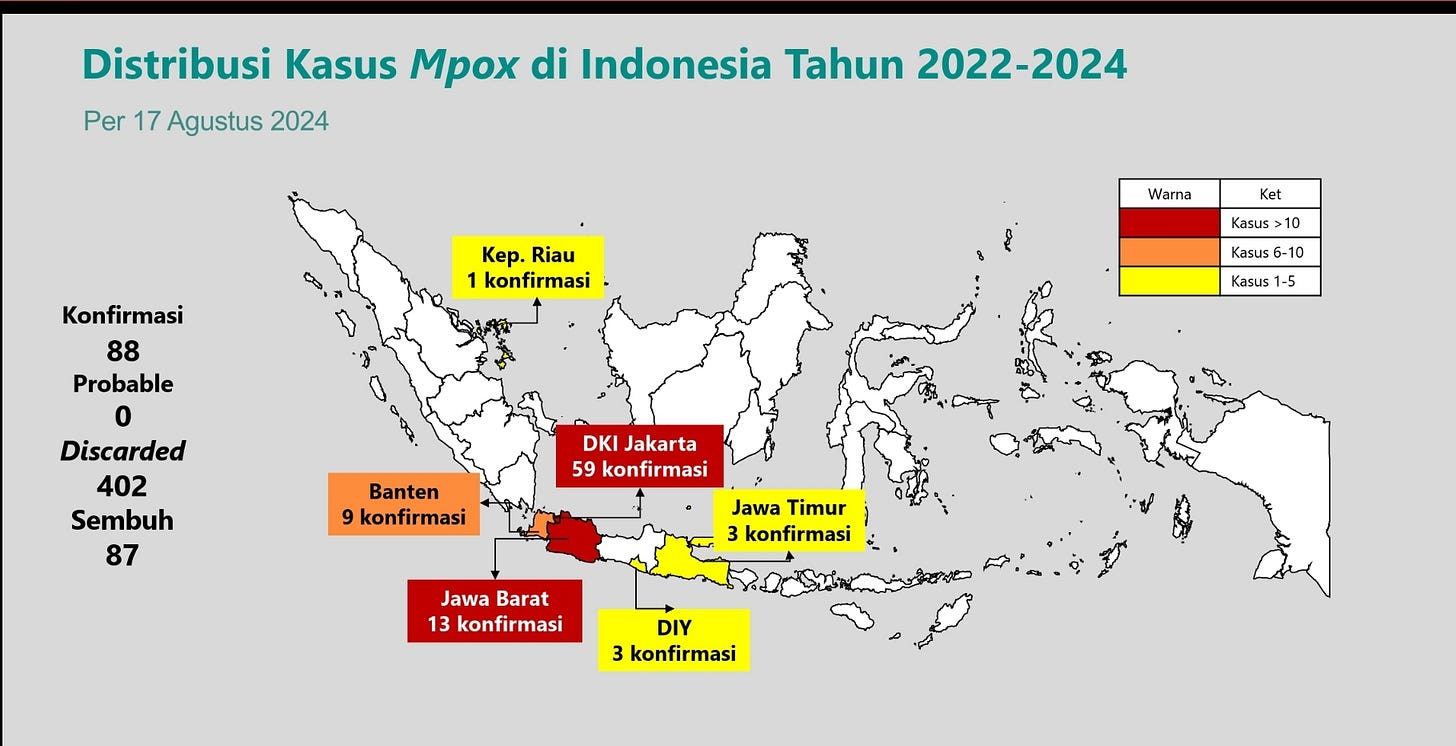The Indonesian Ministry of Health (Kemenkes) announced the latest data on confirmed cases of Monkeypox (Mpox) in Indonesia. There were 88 confirmed cases of Mpox since 2022, with the most cases reported in October 2023.
By location, the cases are spread across Jakarta with 59 confirmed cases, West Java with 13 confirmed cases, Banten with 9 confirmed cases, East Java with 3 confirmed cases, Special Region of Yogyakarta with 3 confirmed cases, and Riau Islands with 1 confirmed case.
Acting Director General of Disease Prevention and Control (P2P) of the Indonesian Ministry of Health, Dr. Yudhi Pramono, MARS said, of the 88 confirmed cases, 54 cases met the criteria for whole genome sequencing (WGS) to determine the virus variant.
"Of the 54 cases, all are Clade IIB variants. Clade II has mostly spread the Mpox outbreak in 2022 to date with lower fatality and is transmitted mostly through sexual contact," said Dr. Yudhi at a press conference on the Development of Mpox Cases in Indonesia recently.
Dr. Prasetyadi Mawardi, SPKK(K), from the Indonesian Dermatologist and Venereologist Association (PERDOSKI) said that the Mpox Clade I variant, both 1a and 1b, has not been detected in Indonesia.
To date, two cases of monkeypox virus clade Ib have been reported outside outbreak-affected areas in Africa, one by Sweden and one by Thailand.
In Sweden, a person who sought care in Region Stockholm has been found to have mpox caused by the virus variant clade I. The case is the first caused by clade I that has been diagnosed outside the African continent.
The individual was infected during a stay in a part of Africa where the spread of mpox clade I is ongoing.
Thailand is the second country outside Africa, and the first in Asia to confirmed a case of the Clade Ib mpox. The case is a 66-year-old European man who arrived from Africa with an ongoing outbreak on August 14, 2024. He began showing symptoms the next day. Over 40 individuals who had close contact with him are currently under observation by health authorities, none have shown any symptoms so far.
"Clade I has a relatively higher fatality rate compared to Clade II, and then this variant is usually caused by close contact, not always sexual contact,"Mawardi said.
Because Mpox primarily attacks the skin, Dr. Prasetyadi appealed to anyone suspected of being infected with Mpox and showing symptoms not to manipulate the lesions on the skin such as squeezing and scratching, and to leave the lesions alone. This is because the lesions, whether wet or dry, have the potential to transmit the virus.
"Patients should also not share personal items such as towels and clothes. If there are lumps or pimples and they are injured or erosive, they should be given medication immediately," he said.
As a preventive measure, the Ministry of Health has conducted surveillance in all health facilities, conducted epidemiological investigations with the community and HIV/AIDS partners, designated 12 national reference laboratories for Mpox examinations, and conducted WGS examinations.
For medicines, the Ministry of Health has prepared symptomatic therapy, depending on the severity of the case. Patients with mild symptoms can self-isolate at home under supervision from the local health center, while patients with severe symptoms must be hospitalized.
The public needs to know, Dr. Yudhi explained, Mpox is transmitted through direct contact with purulent rashes on the skin, including during sexual intercourse.
"People who have sex with many partners and change them are at high risk of contracting Mpox. The main risk group is men who have sex with their own kind," said Dr. Yudhi.






